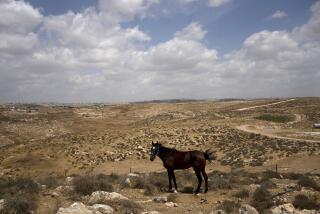Israel failing to live up to pledge, Olmert says
- Share via
JERUSALEM — Israel has failed to keep its pledge to stop enlarging Jewish settlements in the West Bank, Prime Minister Ehud Olmert acknowledged in an interview published Friday, addressing a criticism he expects to hear next week from President Bush.
“Every year all the settlements in all the territories [of the West Bank] continue to grow,” Olmert told the Jerusalem Post. “There is a certain contradiction in this between what we’re actually seeing and what we ourselves promised. . . . We have obligations related to settlements and we will honor them.”
Olmert’s rare admission of fault appeared to be aimed at preparing Israelis for government action against settlements to advance U.S.-supervised peace talks with the Palestinian Authority.
The United States has called settlement expansion an impediment to peace. Bush reportedly plans to raise the issue when he visits Israel and the West Bank next week to measure progress in the talks, which were launched in November at an international conference in Annapolis, Md.
An accord at summit
At the summit, the two sides agreed to abide by an internationally backed but long-ignored 2003 plan known as the “road map” while they tackle the major issues of an accord that would create an independent Palestinian state. The road map, aimed at improving the climate for negotiations, obliges Israel to stop settlement expansion and the Palestinian Authority to halt activity by armed militants.
In their two negotiating sessions last month, Israelis and Palestinians bickered over Israel’s plans to build new Jewish homes in the West Bank settlement of Maale Adumim, near Jerusalem, and the Jewish neighborhood of Har Homa in East Jerusalem. Both communities occupy land the Palestinians seek for a future state.
The Israeli leader defended those plans in the interview. He said he was committed to the road map but argued that a letter Bush wrote to the Israeli government in 2004 “renders flexible to a degree what is written” in that document.
Bush’s letter said that “existing Israeli population centers” should be taken into account in drawing a Palestinian state’s borders. Israel takes this to mean that it will be able to retain large settlement blocks near Jerusalem.
Olmert said Palestinian reaction to the new building in and near Jerusalem would not be so fierce if Israel had kept its promise to halt the growth of more distant settlements. Israel has 122 authorized settlements in the West Bank, built since it captured the territory in the 1967 Middle East War, and more than 100 unauthorized settler outposts.
“The Palestinians have a concern which, from their point of view, is legitimate,” Olmert told the Post.
“We always complain about the [breached] promises of the other side. Obligations are not only to be demanded of others, but they must also be honored by ourselves.”
He did not say what action Israel would take on settlements. But Haim Ramon, a deputy premier, told Israel Radio that the government might start by dismantling about two dozen outposts as early as next week.
Palestinian officials welcomed Olmert’s remarks while criticizing an ongoing Israeli military operation in the West Bank city of Nablus, which has left 38 Palestinians wounded and kept the city’s 150,000 residents under curfew since late Wednesday. On Friday, Palestinian Authority Prime Minister Salam Fayyad declared that the operation, launched after two off-duty Israeli soldiers were killed near the West Bank town of Hebron last week, was undermining the peace process.
Nablus is a test case of Palestinian Authority President Mahmoud Abbas’ ability to live up to his own road map commitment: to stop militants from attacking Israelis.
Progress in security
Late last year, U.S. officials said Abbas’ forces were showing progress. Hundreds of additional police had been sent to Nablus, Bethlehem and Tulkarm, where they were arresting militants and seizing illegal weapons. Palestinian officials said the crackdown was effective when Israeli troops stayed away from those cities because their absence gave Palestinian police more credibility with the population.
Palestinian police arrested two suspects in the killings of the soldiers, but Israel said they were affiliated with Abbas’ Fatah movement and that one was a member of his security forces.
Seventy jeeploads of Israeli troops have entered Nablus, triggering clashes with stone-throwing youths and scattered armed resistance. By Friday, the army said it had arrested 13 wanted militants and seized caches of weapons, explosives and material for making rockets.
Israeli government spokesman Mark Regev said more time was needed to rebuild and reform the Palestinian security forces before Israel would allow them to take over full security responsibility for the West Bank.
--
Special correspondent Maher Abukhater contributed to this report from Ramallah in the West Bank.
More to Read
Sign up for Essential California
The most important California stories and recommendations in your inbox every morning.
You may occasionally receive promotional content from the Los Angeles Times.










